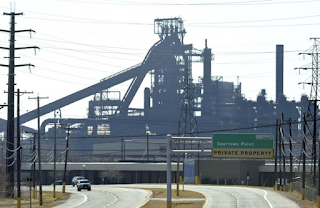UPDATE: This story ran in the Dundalk Eagle Opinion section of May 1, 2025. It was shared on Facebook and I received a number of comments of thanks and a few memories from others - "the smell of wet snow mittens drying on the radiator."
# # # # #
At our monthly Writing is Fun meetings we decide a prompt for writing for the next meeting. Length is set at 2 pages so we can read them at the meeting. There is quite a diversity of writing. Some are real life recollections, some fictional vignettes, and sometimes there's a poem.
 |
| Bethlehem Steel mills and housing (mid right) |
The prompt for December 2023 was Something you can never do again. Here's what I wrote.
Hiraeth (Hi er ayth)– Carol Kagan
In the mid-20th century, Bethlehem Steel’s Sparrows Point plant was the world’s largest steel mill, positioned at a deep tidewater area of the Patapsco River, a tributary of Chesapeake Bay.
Coming in the main road you passed the Bungalows where some
of the workers lived. As the road curved left, the monstrous black furnaces
loomed in the sky ahead while long gray buildings and train tracks lined the
roadside. Once you approached town, Dr. Farber’s big house and offices opened
the way down “D” Street, lined with stores, churches, and schools. Lettered and
numbered streets were laid in neat grid with a variety of houses on the streets
beyond. This company town was a planned community providing everything the
workers might need to stay close to work. This place was my home for thirteen
years. So many memories of growing up.
 |
| Beechwood Rd Bungalows |
 |
| Me 1953 Mom, Aunt & Uncle |
There was a large, fenced playground with jungle gyms,
swings, see-saws, and the “Stop I’m going to throw up” spinning merry-go-round.
We would pick long vines of honeysuckle from the fence and wind it into a crown
for whoever was queen for the day, often the one who had a candy necklace or
bracelet from the newsstand candy bin.
Birthday parties were few and far between at that time. For
my eighth birthday, I went to my grandmother’s house, and she had a gift for
me, a pretty Sunday school dress. I put it on, my aunt fixed my hair, and I
headed home to show off. When I got there the backyard picnic table held a cake
and was decorated. All my friends were dressed up, too. A surprise party!
 |
| "D" Street house-right side of the duplex |
We were old enough to be outside playing until the streetlights came on. There were other activities such as the October 30th “moving night” when we roamed the alleyways and moved things. No destructive pranks, just moving plants or trash cans from one house to another.
There were times, when I had moved away and was working, I
would drive through the old neighborhoods, remembering who lived where, seeing
changes – some big, some small. The cars parked there were newer models. The
store windows had up-to-date clothes or signs for the newest, best products.
The bank was converted to a café with tables by the window. Home had changed.
The dictionary states that home is a place, a residence, a
dwelling. But home is much more.
How, and what, we remember of our experiences in life is a
significant part of our identity. And our physical home is an integral part of
that identity.
There is a saying, based on a Thomas Wolfe book, that you
can't go home again. Within the context of that story, it means that when you
go home, things are different, changed. Therefore, it isn't the home you know.
In 1973, the Bethlehem Steel mill closed. All the businesses
closed. All the residents moved to nearby communities. Bulldozers came in and the
company town was demolished.
Hiraeth (Hi er ayth) means a nostalgic longing for a place which can never be revisited.
I can never go home again.







No comments:
Post a Comment